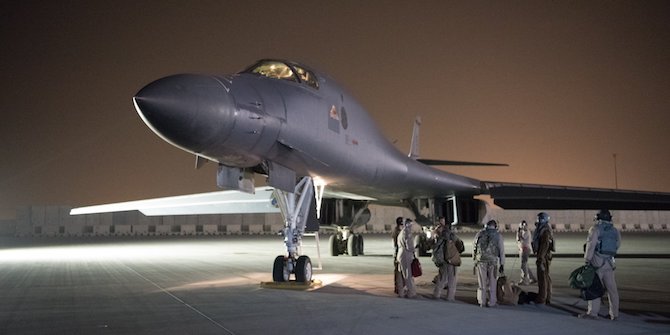by Toby Fenton

International law is in flux over Syria. The large-scale killing of civilians by the Syrian government; violations of international humanitarian law by multiple parties to the conflict; the use of chemical weapons on multiple occasions; the use of force against Syria by external actors – this non-exhaustive list demonstrates that a significant body of international rules have been cast aside.
The joint US-UK-France strikes in April 2018 against government and military targets in Syria, following an alleged chemical attack in the city of Douma, present a useful opportunity to outline the dilemma faced by those wishing to uphold the rule of law in a complex and fractured international environment.
Illegality of US-UK-France strikes
The international legal basis for the strikes is thin to non-existent. The use of chemical weapons is prohibited by multiple international agreements, including most recently the 1993 Chemical Weapons Convention (CWC) to which Syria acceded in 2013. However, as is often the case with such conventions, the CWC is impotent when it comes to punishing non-compliance: states may ‘recommend collective measures… in conformity with international law’ and they may raise issues of non-compliance before the UN General Assembly and the UN Security Council – but that’s about it.
Can states use military force to punish the use of chemical weapons? The UN Charter’s Article 2(4) prohibits the use of force against another state, except in self-defence or when authorised by the Security Council. The recent strikes cannot be justified as acts of self-defence – the US, UK and/or France were not victims of attack by, or originating in, Syria – and the Security Council did not authorise force.
The provisional lawfulness of any resort to using force against another state (jus ad bellum, in legal lingo) is determined not by the severity of the unlawful action (in this case, the use of chemical weapons) cited as prompting the response, but by whether that unlawful action either renders operative states’ right to self-defence or is otherwise authorised by the only international authority that possesses competence to mandate the use of force: the Security Council. All considered, the strikes were a prima facie breach of international law. This assessment should not be contentious; in fact, it was through just such an interpretation that the supporters of NATO’s bombing of Kosovo in 1999 considered that action to be unlawful-but-legitimate.
Might makes right?
International law provides but one basis for influencing state behaviour. Other variables, such as ethical imperatives and national interest, also play a part in decision-making.
There is an ethical argument to be made that the use of chemical weapons is so abhorrent, and the images of men, women and children suffering a slow and painful death are so devastating, that international inaction was simply not an option. There are some acts so reprehensible that the world cannot sit idly by and watch. While nobody wishes to see the use of chemical weapons become normalised, the number of human lives in Syria lost in that manner is far less than those lost through the use of conventional weapons (although this fact in no way excuses that latter).
In opting to respond to the latest alleged chemical attack through direct and swift military action, the US, UK and France demonstrated a greater concern not for the number of lives (the quantity of killing) taken in the course of the Syrian conflict, but for the particular weapons (the quality of killing) used to take them. Yet it remains unclear why, from a purely ethical perspective, the use of chemical weapons would justify a swift military response while the killing of civilians en masse throughout the Syrian conflict has not.
The normative imperative to uphold the prohibition on chemical weapons has also been cited to explain the strikes. In this way, the strikes demonstrate a willingness to use military force to uphold one particular set of violated norms regarding chemical weapons, following years of refrain from using force to uphold another set of violated norms – those embodied in the laws of armed conflict and international humanitarian law, which have been violated numerous times since the start of the Syrian conflict.
Here the UK, along with the US and France, appears to have made a judgement that, more than any other set of norms, it is the upholding of the chemical weapons norm in particular that outweighs the political and legal risks of using force. To make such a judgement is arguably a state’s prerogative, although the UK must be prepared for others to arrive at different judgements.
The strikes can also be grounded in national interest, as UK Prime Minister Theresa May has clearly articulated to Parliament. In addition to emphasising that pursuing ethical and normative imperatives is, in fact, in the UK’s national interest, some voices have also argued that for British military action to be subject to, and curtailed by, the authority of the Security Council would mean allowing Russia to wield a veto over British foreign policy. Technically, this is true. By using its veto at the Security Council, a permanent member, like Russia, can block the Council from authorising an action proposed or desired by another member, like the UK. A state resentful at this phenomenon is nothing new.
However, the machinations of the Security Council and the veto rights of its permanent members were conceived not only to reflect and institutionalise the post-1945 balance of power – something that has benefitted the UK greatly – but also to put a halt on the rapid resort to force that had often characterised international relations up to that point. Just as the Security Council is widely accused of impotence in its inability to ‘act’ – often taken to mean authorising military action – amidst international crises like that in Syria, Prime Minister May’s current position implies making the Security Council impotent with respect to preventing states from taking military action whenever they judge it in their particular national interest to do so.
This would, in turn, suggest a veritable return to the pre-UN Charter days of international relations – a time when might was deemed, quite often, to make right. Whether this would also be in the UK’s national interest is something that, one hopes, would warrant further reflection.
Prudence and precedents
For the UK, the latest alleged use of chemical weapons in Syria has raised questions of when, why, and how to respond to particular actions that seriously violate the values, laws or interests of the UK or the international community more broadly. Whatever decision the UK made would have found a critical reception in at least some quarters. Time will help reveal whether the decision the Prime Minister opted for can be judged to have been the right one.
Whatever actions it may take on the world stage, prudence implores states to be aware that those same actions may provide the justificatory basis on which other states could seek to ground their own future actions, hostile or otherwise. Those external actors participating in the Syrian conflict, and responding to developments therein, would do well to keep this in mind.
Toby Fenton is Projects Assistant at the Middle East Centre. He has a BSc in International Relations and recently completed a Masters in International Peace and Security at King’s College London. Prior to joining the Middle East Centre he worked at LSE’s Institute for Public Affairs. He has also worked in a research and project support role for a business intelligence consultancy, in addition to voluntary research roles elsewhere. He tweets at @tobyfenton







